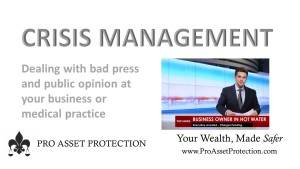 Issues in the news like the recent Ashley Madison data dump prove how negative publicity related to your practice or the personal activities of any of its owners or employees, can have devastating effects on your professional reputation and financial solvency. Regardless of the cause, every business and medical practice owner and manager should understand some PR crisis management basics.
Issues in the news like the recent Ashley Madison data dump prove how negative publicity related to your practice or the personal activities of any of its owners or employees, can have devastating effects on your professional reputation and financial solvency. Regardless of the cause, every business and medical practice owner and manager should understand some PR crisis management basics.
In our last discussion we provided some specific cautions about the news value and relative high profile doctors and medical practice executives present to the media. Something seemingly far removed, like a guided lion hunt in Africa or the recent discovery that a Canadian company sold tainted, counterfeit drugs to dozens of American oncology practices can literally shut a practice down if not handled the right way. There is no perfect PR playbook that’s universally applicable to every situation, so use the specific tips provided below as a starting point and adjust them accordingly to fit your specific facts. Accounting for the legal nature of the crisis, your local community and the specific title and relationship of the individuals involved to the practice are always prerequisites.
Is this a Legal Issue?
If the crisis involves criminal or civil legal liability, a good first step is to consult with the attorney representing you about any statements you may wish to make and how they suggest you should (or if you even can) address media inquires before making any verbal or written statements. What you may consider general, conversational statements can and will be used against you either in court or in the much harsher court of public opinion and may affect your rights. You should also discuss how this information should be shared with your staff and any specific guidelines your legal counsel suggests you inform them of.
Put The Right Person In charge
Appointing a qualified Information Officer (IO) is vital first step. The IO, whether a part of the practice or a third party is the official source of contact and information for the media and the public. Choose carefully, it may not always be the best idea to represent yourself in this capacity and having a third party may depersonalize the situation and add objectivity. A good IO is articulate, informed, and has the professional temperament and authority to answer specific questions on your behalf. Inform your staff and family of the IO and their role and ask them to politely refer questions to that person. During such a crisis employees should also be reminded of any confidentiality provisions outlined in your office’s employment manuals and handbooks , which we assume you have in place and which are custom drafted to include such vital provisions.
In some cases, if your attorney has the appropriate level of media savvy it may be appropriate to have her be your IO, especially in cases involving potential civil or criminal liability. In other cases, if the attorney is not comfortable in that role for any reason, it may be wise to hire a professional crisis management resource, like a PR agency that will have the skill set and media contacts to get the right story out there.
Have One Message and Be Consistent
Information that you control and have outlined should be disseminated only through the IO. Answer what you can. Neither you nor your staff should be perceived as evasive and honest answers like, “I don’t know, I can’t comment on the personal life of Dr. Jones, this is not an issue related to our practice,” or “I’m not authorized to speak on behalf of the practice on that issue”, are completely reasonable when true. Your message should also empathetically acknowledge harm or injury to third parties in a simple and factual way, as you would address any similar situation involving people you don’t know personally. “We are saddened and surprised to learn of the injury (accident, allegations, etc.) and hope the matter is resolved soon…”
Finally, when appropriate, control speculation and demands by the media and the public by providing accurate updates and identifying a realistic course of action or solutions being considered, but don’t make promises you can’t or are unlikely to keep. Communicating the right things at the right time coveys that you are working to resolve the issue and that you and your practice are deserving of the trust and position you previously held in the community, both personally and professionally.
This article was originally published in a different form at www.PhysiciansPractice.com, The Nation’s Leading Medical Practice Management Resource. The author, Ike Devji is an Asset Protection attorney with over a decade of experience in helping to protect thousands of HNW clients from a variety of risks and has written over 200 articles on related issues.


